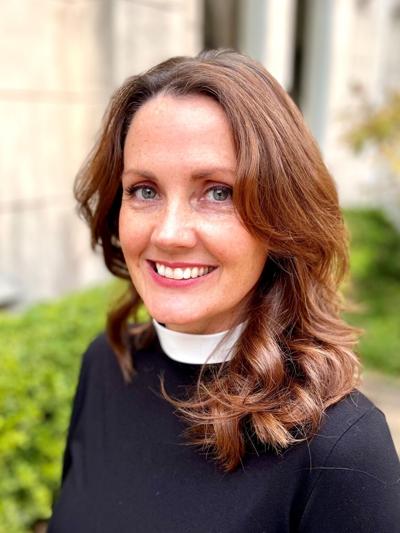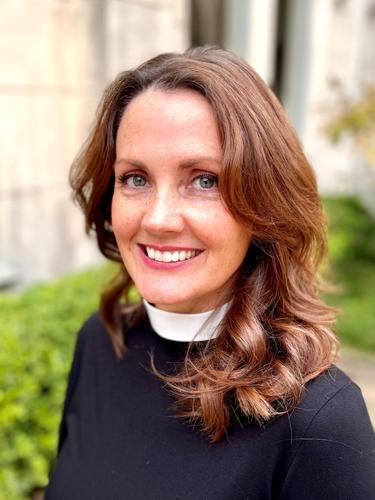The Reverend Annie Knazs Jung serves in ministry leadership as an Episcopal priest. She will begin her new position as rector of St. Andrew's Episcopal Church and School, in the Carrollton neighborhood, in January 2024.
Jung attended Sweetbriar College in Virginia and then completed her bachelor's degree in mass communication, public relations and her master's degree in community counseling from LSU. Her early career focused on youth ministry and then expanded to become a licensed professional counselor. She served as a mental health counselor in clinical settings, schools, and her own private practices in California and Louisiana.
In 2022, Jung graduated from Virginia Theological Seminary with a master's of divinity degree.
Can you tell us about your journey to being an Episcopalian priest?
I have grown up always being drawn to church. Even as a child and teenager, I was heavily involved at church. However, I never thought I would be a priest.
Whenever I spent more and more time discerning — spending intentional time praying about it and talking with trusted people to see if this was actually a calling — it sounded like I was the last person to realize that it made sense. As a child, I did children's and teen ministry, and I was working for churches from when I was a teenager onward. I came to the Episcopal faith when I was 19, and I started working in an Episcopal church as an assistant youth director before I even became Episcopalian.
When I started a career in mental health counseling, I continued to help and volunteer in youth ministry. I felt a profound sense of a call to consider becoming a priest. I met a woman priest, but I didn't know many. Honestly I think that was part of, maybe even subconsciously, not being able to view myself as one because I had not been around them.
The church I grew up in included all men church leaders, so it wasn't until I started to be around some ordained women that the deepest parts of myself were able to start connecting that it was possible for me.
What did you learn from being around ordained women, and how has the experience been for you as a priest?
The first thing I learned was that it is possible. These women were going about their days being exactly who they are as women — and they were priests, either at a church or a chaplain at a school.
Being raised in the Deep South and the heavily Roman Catholic influence in South Louisiana, women priests were not a common thing. For some people, it's still hard to wrap around the idea that this is a true possibility. Once people get to know me more, particularly women around my age or young women, they'll say, "We needed more people like us."
I look back, and I think how helpful it could have been to me to have had a female ordained minister to go to when I was considering marriage, pregnant with any one of my three children, juggling full-time work and motherhood and being a wife. I had amazing women who were deeply involved in their churches, who I valued in their wisdom, but it is an odd thing to look back and see that it was only men around me who were considered the person that you would need to talk to as the head pastor or priest.
What challenges do you face as an ordained woman?
One thing I deal with often is people just not recognizing that I'm a priest, even when I am wearing my collar. Just yesterday, I was at a restaurant for lunch, and this man passed by me. I was wearing a black shirt with my priest collar.
He said, "You know, with that shirt on, you kind of look like a priest, except you're not."
I said, "Well, actually, I am," and he said, "What?"
That is the common thing. I've even been asked that in church services where people ask, "What are you doing?" I don't think anyone is asking the male priest that question when they're in the exact same clothing I'm in in the church service.
But these are people who maybe were raised differently — they might have been raised where ordained women were not possible.
You've been on a path toward serving others for a long time. What do you see as the benefit of serving in "nontraditional" ways?
Any time we can crack open a preconceived box that we have set for ourselves — any time we can start to open up preconceived notions of how God comes into the world, how God moves through people in the world, where God's presence is — it can open up spiritual development in ways you never thought.
It allows this opportunity to not get stuck in a rut of spiritual development, noticing that we can learn a lot about God's love, grace and mercy for us by seeing God's work and other people who are different from us.
People who might be carrying around preconceived notions of what Christianity is or what religion is or what a Christian looks like, when they meet someone who is different, they start to go, "Huh. Well, maybe I wasn't interested in it because it had to be a certain way, and now that I see it could look a little different, maybe there's another way to think about things."
Some people have been turned off by either religion or Christianity because of a past harm. When they can meet someone who allows them to understand God in a different way, it can heal wounds and let grace and peace come back into their lives.
What is the importance of meeting someone where they are?
When you meet someone where they are, you're giving honor and respect to exactly what they've been through and who they are in that moment. You aren't trying to change them to meet your goal.
Every person is truly a gift from God and has a magnificent purpose. Who am I to not value where someone is in their moment?
I have learned that people draw close to their spiritual center in a lot of different ways.
Do you have certain goals you'd like to accomplish as the new rector of St. Andrew's Episcopal Church and School?
My No. 1 goal is to engage in life together. I want to get to know this parish and see where they want to thrive. How do they want to live in community with each other, with their neighborhood and with the needs of our community around us?
How can we really grow in our spiritual life by getting to know people different than ourselves, seeing where God is moving in other cultures and communities?
There's a sense of the church wanting to grow and welcome new people and experiences. I'm really excited to help foster that sense of holy curiosity and seek great spiritual adventures together.
They also want to grow their youth program, which youth ministry is a big part of my foundation. It's a big connection of why I feel that church life is so important. I want to make sure that our teenagers know they are valued, important and that their voices need to be heard. I want to give them really safe spaces to foster themselves as they're growing in their own identities.


